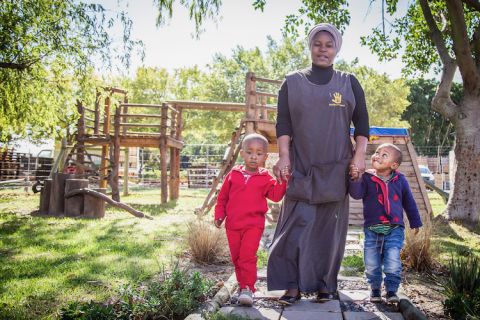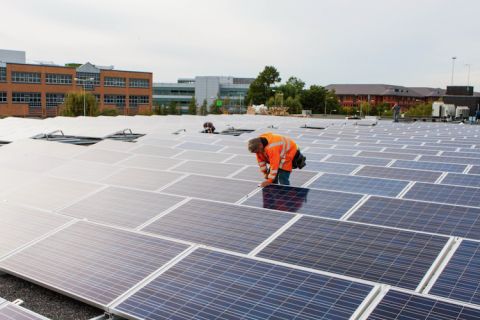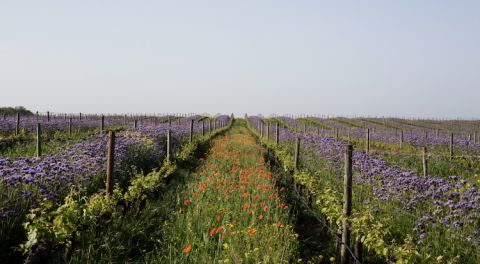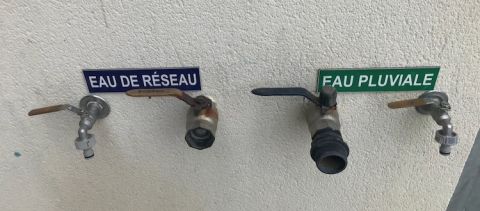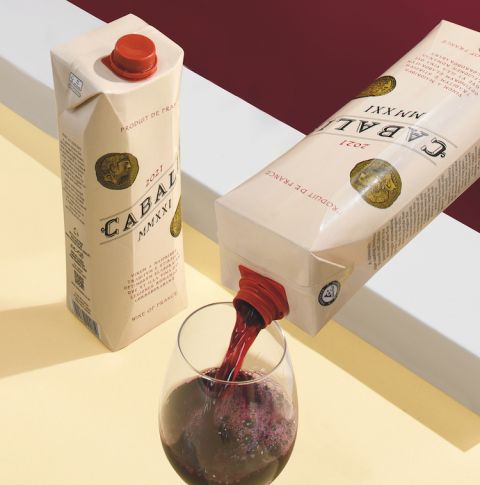7 November 2022 A look at two of the UK's leading online wine retailers, The Wine Society and Laithwaite's, and their approach to sustainability.
Sustainability has become a buzzword without a clear definition but two prominent UK-based wine retailers are putting impressive effort behind their words.
'Wine has an advantage over other products (clothing, for example), in that you know where the wine comes from and who made it. There is visibility in the supply chain', says Pierre Mansour, director of wine at The Wine Society (TWS).
This is an advantage but also a very public responsibility. Facing up to the challenges of running a sustainable business is preoccupying Mansour and TWS's director of sustainability Dom De Ville, as well as Nick Taylor, Laithwaite's wine director, and their sustainability director Chris Millson.
TWS, which appears frequently on the pages of this site thanks to their well-chosen and well-priced wines (see last Friday's tasting article, for instance), is a 150-year-old member-based co-operative. Membership is open to anyone in the UK with a one-off payment of £40 for a lifetime share (typically with a £20 discount on your first purchase), with no further strings attached. All profits go back into the business, to benefit their more than 180,000 members. The wines are sourced from 800–900 winegrowers around the world but thanks to the way the buyers work, and the longevity of their relationships with producers, there is a personal connection with each supplier.
Laithwaite's is not quite as old as TWS but it's also a long-established company, still family-owned and run after 50 years but, as Jancis explained in Vintage Laithwaite's, it's the biggest family-owned specialist wine retailer in the world (for more background, see Britain's biggest wine company, written by Jancis on their 40th anniversary, and Tam's review of Tony Laithwaite's autobiography). It originally sold wine in the UK but now delivers wine to around 1,000,000 customers internationally, from Australia and Asia to the United States. Laithwaite's big or small is our most recent review of Laithwaite's wines in the UK.
In what follows, I compare TWS and Laithwaite's, not to pit them against each other but to demonstrate different approaches, both in terms of visibility and remit.
Sustainable visibility
The most visible difference between the two companies in their approach to sustainability is that TWS have been extremely proactive in explaining to the public what they are doing, and what they plan to do, with an extensive and dedicated section on their website. De Ville is keen to emphasise accountability and transparency. Perhaps this reflects the very open, communicative approach of the co-operatively-run TWS, which behaves more like a family business than most companies that are actually run by families, as well as its very distinctive and well-nurtured relationship with its members.
Laithwaite's seem to be working much more quietly and more like the big business that they are. For instance, Laithwaite's website offers no information about their already substantial progress towards reducing carbon emissions. Nick Taylor, who sent me an excellent summary of what they have done and what comes next, explained that they are especially concerned about not over-promising.
'We think it's important that we are able to measure and have a strategy to tackle our Scope 3 emissions – those largely of our suppliers – before trying to communicate targets and reductions externally. [See below for an explanation of the various scopes.] These are by far the largest proportion of our overall emissions, and we believe that without clarity of plan for Scope 3 one is only skimming over the top and not fully addressing the problem', he wrote. However, he explains, they are communicating the more concrete moves they have made, such as trialing bag-in-box, paper bottles, Tetra Pak and 100%-recycled glass bottles, 'so that customers understand why they are seeing these formats for some of our top-selling wines, and what the carbon benefits are of that packaging'.
Goals, ambitions and accreditation
The Wine Society
TWS are working with sustainability advisors 3Keel to measure carbon emissions across their supply chain 'covering approximately 1,000 wineries, shipping to the UK, our operations in Stevenage and onward delivery to members' homes'. They are also working with the Herring Consultancy, a two-woman partnership, on their initial eight-year plan for the even broader goals of responsible sourcing (see below).
De Ville agreed that LCAs (life cycle analyses/assessments) and carbon footprinting are open to confusion but believes that what they have done is 'a proper, comprehensive footprint' that covers scopes 1, 2 and 3, whereas some claims to net zero certification are based only on scopes 1 and 2. (Tam, our sustainability editor, pointed me in the direction of the Greenhouse Gas Protocol for a helpful definition of these key terms illustrated and referred to again below.)
Apart from the greater public presence described above, what distinguishes TWS from Laithwaite's is their inclusion of the social aspect of sustainability. According to De Ville, this is of increasing concern to their members, who want to know not only that the wine in their glass 'has been made and brought to them with minimal impact on the environment – from grape growing, wine making, transportation, packaging etc' but also that 'people right through the supply chain have been treated properly and paid a fair wage or price'. Some of their suppliers, for example Villiera with their Pebbles Project in South Africa, and Forage Supply Co in South Australia, building units to help homeless people in South Australia, are highly engaged in the local community.
In both respects they are aiming to support their winegrowers. Their new supplier code will set out social (human rights and working conditions) and environmental expectations for their growers and producers. As their 800+ suppliers are at different stages on their sustainability journey, this code will be rolled out gradually to existing and new suppliers over the course of 2023 and will be actively followed up to assess compliance or progress towards compliance. They will seek to pinpoint the areas of greatest risk, for example with regard to working conditions in the vineyard, which may be region- or country-specific.
'This risk-based approach is something that has become quite common in other sectors and categories, but wine is lagging behind', says De Ville, who points out that discrimination, exploitation and slavery are little talked about in the wine world, particularly when it comes to seasonal workers and vineyard-worker crews who are employed through third-party companies such as those in California and, increasingly, Bordeaux. A winegrower may be paying a proper wage to the contractor but the contractor may not pass that on.
(If you interested in more on this issue, the Swedish alcohol monopoly Systembolaget did a study with Oxfam and found many instances of worker exploitation in Italy, as reported in Wine Business International. You can download the full report here.)
TWS targets for reducing carbon emissions may be more easily specified than those for social sustainability but they are just as ambitious and very public: to be 'net zero, across our business and supply chain by 2040'. This is particularly challenging because it includes their entire supply chain, including emissions from sources not owned or controlled by the company.
Their interim goals are bravely specific:
- By end of 2022: Calculate our carbon footprint, set science-based reduction targets and develop a road map to reach net zero by 2040, across our business and supply chain.
- By end of 2024: Be carbon neutral, by investing in natural ways for vineyards to sequester more carbon. (Prior to this, they will publish their full carbon footprint, targets and reduction road map in spring 2023, for transparency and accountability.)
- By end of 2028: Be zero-emissions from the operations we own (vans, warehouses, office).
- By 2040: Be net zero across our business and supply chain.
Most companies seem to start out a race to zero with a two-pronged attack: reducing their carbon emissions and offsetting the emissions that they are not yet able to reduce to zero. This takes them to carbon neutral, an important stage on the way to net zero.
However, and at the cost of more immediate certification, TWS are planning to use insetting, ie internal offsetting that benefits their own supply chain. As De Ville explains:
'Rather than selecting a recognised offsetting scheme such as those certified by Gold Standard and paying into that to get certified, we would take the equivalent amount of money (or likely higher) and invest it in one or more projects in our supply chain that will sequester enough carbon over time to offset our emissions.
'But this is not just about offsetting simply to become carbon neutral. It is really about using the money to learn something beneficial for the sector, for example about: (a) the sequestration potential of vineyards; and/or (b) what kind of biodiversity/soil health projects can help in the fight against climate change (what works/what doesn't); and/or (c) can these initiatives also help the vineyard better cope with the effects of climate change; and/or (d) does this also help improve wine quality (obviously highly subjective and maybe not possible to prove, but wouldn't it be wonderful if we could get some data on this?).'
What De Ville was keen to point out was that while insetting has greater potential benefits for them than offsetting, the most important work they can do is to actually reduce emissions: 'While I strongly feel there is an important place for offsetting and/or insetting in the global fight against climate change, the primary focus must be on carbon avoidance and reduction. Getting our emissions down as quickly as we can – across all three scopes. This is why our first step is creating our ten-year carbon reduction road map, which we are working on at the moment. We will then work out our insetting plans next year, once we have our reduction road map in place.'
Laithwaite's
In 2021 Laithwaite's engaged sustainability consultants EcoAct to help them put together a detailed study of their 'entire end-to-end supply chain'. They also appointed Chris Millson as their sustainability director. Taylor elaborates, 'This [study] included our owned businesses, and those of our third-party wine suppliers, shipping and logistics. This provided us with a clear view of our carbon footprint across Scopes 1, 2 and 3:
- Scope 1 emissions include those which relate directly to our business (eg the fuel used in our own vehicles).
- Scope 2 emissions relate to the energy used at our various sites.
- Scope 3 are those indirect emissions which result from activities upstream and downstream of our business. They include winemaking, bottling, packaging, shipping and deliveries.'
Taylor says they are aiming to halve Scope 1 and 2 emissions and reduce Scope 3 by 25% (compared with a 2020/21 base year) by 2030. But he also points out that most of the company's emissions sit within Scope 3. To speed up the transition, they want to increase collaboration with suppliers.
'So in December 2021 (timed to align with COP26), we hosted our first annual global Supplier Sustainability Conference, focused on carbon emissions. We ran two sessions to be able to manage the global timezones, and shared the details of our carbon footprinting and communicated our commitment to tackling carbon in our supply chain.' Roughly 45% of their suppliers, from 14 different countries, representing roughly 85% of their global sales volume, took part in the conference.
Supporting the winegrowers
This is clearly a huge challenge for both TWS and Laithwaite's. I asked both companies if they were planning carrot or stick approaches, and if they would delist suppliers who were unwilling to engage in their sustainability goals.
Taylor of Laithwaite's replied, 'It's all carrot for now. We have already been supporting some of our smaller suppliers with measurement of their carbon footprints, and are actively exploring how we ramp up measurement of emissions (using primary data from vineyards and wineries) across our entire supply chain. We have financed support work for those smaller suppliers to start on their own sustainability journey – these projects have included "Energy Monitoring" for a long-standing supplier in Tuscany; an "Ecological Impact Assessment" for a husband-and-wife team in the Corbières; "Renewable Generation Study (Photovoltaics)" for a one-man-band producer in South Africa; and initial carbon footprint work for another four small suppliers who would otherwise not have the resource or skills to get going.'
TWS, like Laithwaite's, have held their first sustainability forum, attended by over 200 winegrowers, and their plans include an online repository of ideas, information and resources, encouraging their suppliers to share success stories, such as the collection and use of rainwater at Ch Teynac in St-Julien.
Taylor, like Mansour, highlighted the need to be mindful that individual suppliers have individual circumstances/budgets/resources. 'It's really about the direction of travel, accurate tracking and reporting and having a clear end goal, rather than trying to obligate compliance by an arbitrary date.'
Mansour explained that all their growers are concerned about climate change – they are 'shocked and motivated' – but he knows that some will need more support than others. They would rather enable than punish. Some of their growers, Tablas Creek, the Symingtons (the main image above shows endangered European kestrels finding shelter in their vineyards in Portugal's Douro Valley), and Dog Point, for example, are way ahead in terms of regenerative practices. For others, the insetting scheme described above seems to be the best way of investing in their supply chain. In addition, they are supporting growers in the process of becoming certified, in some instances supporting them financially – as they did in the past in relation to quality assurance, helping growers to achieve HACCP certification. Whether the TWS sustainability budget of £500,000 a year is going to be enough has yet to be seen.
Who pays for sustainability?
I asked both Taylor and De Ville if they expected the achievement of their sustainability goals to result in additional costs to the business, and if these would be passed on by increasing wine prices.
Laithwaite's: no planet, no profit
Taylor was succinct: 'I think we need to consider any sustainability "costs" as investments in a climate-safe future. A future which allows us to continue operating. No planet, no profit. Achieving our sustainability goals will require investment. Like other organisations we will assess the business case for each. In many cases this is relatively straightforward but, in some cases, we will need to recognise value that is less easily quantified in financial terms.'
In some cases, he points out, the moves actually create more value for the customer. 'An example of this would be one of our top-selling wines, Cabalie, that we have recently sold to customers in one-litre Tetra Paks®, for the same price as the 75-cl glass bottle. So an extra 33% of wine for the same price, and lower carbon emissions.'
At the same time, he allows that the consumer has a role to play in the move to a more sustainable future. 'Consumers may need to accept that their regular (Amazon) next day or same day delivery is simply no longer viable.'
TWS: we will not put up our prices for sustainability
De Ville made an assurance that they would absorb the upfront costs of their targets and he believes that what they are doing will pay for itself. 'It is the right thing to do. It makes business sense in the long term.' Mansour added, 'Sustainability will soon be seen to be common-sense business practice. Any business that does not commit to it will lose competitive edge.'
What's most important, they believe, is to make it easy for customers to buy sustainable products. According to Mansour and De Ville, a study has shown that 80% of shoppers in the UK say they want to buy sustainable products but in practice they will choose them only if products are otherwise equal (eg same price) and clearly labelled as sustainable.
TWS are also already seeing financial benefits in some parts of the business, for example the solar panels installed on one of their warehouses last year will save them around £40,000 in energy costs and save 44 tonnes of carbon a year.
They can also foresee imminent gains with regard to the UK system of taxation on a company's waste, which is based on estimated weight. TWS would pay significantly less if their own waste were accurately measured, which it will be as part of their programme for emissions reduction. And of course there are cost savings in lightweighting bottles. One further example is the introduction in the UK in 2023 of Extended Producer Responsibility. Instead of consumers paying, via their council tax, for local recycling of packaging, it will up to producers to cover those costs. Waste is measured by weight. If they do not reduce their packaging waste, their compliance fees will go up from £120,000 to a million next year.
Industry collaboration
The good news is that there is a great deal of collaboration within the industry already: Laithwaite's are part of the Towards Net Zero working group, which so far includes The Wine Society, Berry Bros & Rudd, the Wine & Spirit Trade Association and Hayman's gin distillery. They aim to agree 'commonality of targets and reporting' so that suppliers who work with more than one retailer are not drowned in requests for information.
De Ville also said they and other like-minded UK retailers, including Waitrose, Naked Wines and Laithwaite's, were hoping to establish some sort of online platform similar to Sedex in the clothing industry, 'a membership organisation that provides one of the world's leading online platforms for companies to manage and improve working conditions in global supply chains'.
Laithwaite's is also a member of the Sustainable Wine Roundtable, 'the only global, independent membership organisation committed to advancing sustainability and collaboration in wine', of which TWS and JancisRobinson.com are founder members. One of SWR's most ambitious goals is to establish a global sustainability standard in wine, which would have made this a much shorter article ...
Other businesses stepping up to the challenge
TWS and Laithwaite's are two of the most prominent, forward-looking online retail wine businesses in the UK when it comes to sustainability, but of course they are not the only ones. Here are a few examples I have come across recently.
The Swedish monopoly Systembolaget recently announced their targets on their website, declaring the aim to be a fossil-free and circular business by 2030, and net zero by 2045. They are also collaborating with the other Nordic alcohol monopolies to cut carbon emissions by 50% by 2030 compared with their 2019 levels.
UK's Virgin Wines announced in October this year that they were the first online wine retailer to be certified carbon neutral, for scopes 1 and 2. They have been awarded the PAS 2060 standard, developed by the British Standards Institution in 2010, by the NQA. This involves not only offsetting emissions but reducing them year on year. More detail is available on their website – you have to search for the link at the end of their home page.
Naked Wines have a section on sustainability on their website, though it takes a while to find it. However, they have communicated directly with their customers what is on their green agenda, including a saving of 450 tonnes of glass by lightweighting 6 million bottles, not using capsules on any of their wines (voted for by 93% of their most engaged customers, their 'Angels') and creating a space for Green Wings (a group of winemakers) and Angels to share ideas on sustainability.
The terminology and the accreditation of a sustainable wine business may be open to confusion – inadvertent or deliberate – but there is clearly a huge amount of work going on, whether publicly promoted or not, and a strong belief that there are no other options.
No planet, no wine.


